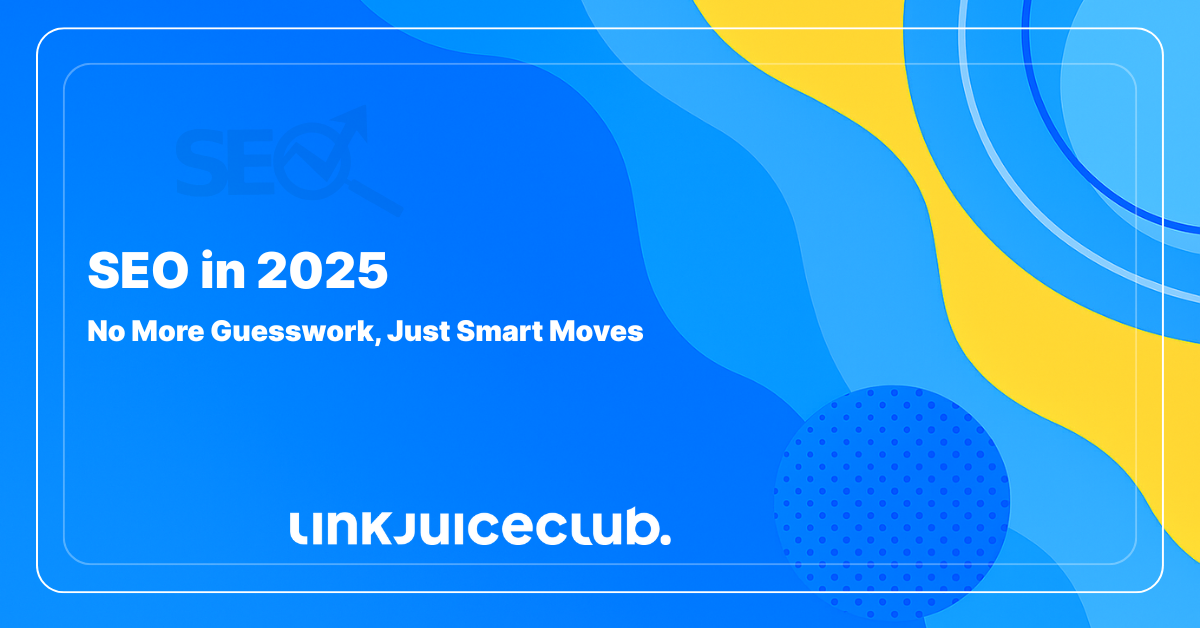
SEO in 2025: No More Guesswork, Just Smart Moves
If you’ve been following our blogs lately, you could easily come to a conclusion that SEO in 2025 isn’t the same game you were playing two years ago.
Algorithms have matured, search habits have changed… and the rulebook? It’s been rewritten in invisible ink. If it feels like your once-reliable strategies are now ghosting your traffic reports, you’re not imagining things.
Marketers everywhere are hitting the same wall; what used to work simply doesn’t work like it used to. But here’s the good news: the winners aren’t the ones chasing every trend. They’re the ones building search strategies that play nice with user behavior, AI interfaces, and multi-channel ecosystems.

Search Engines Have Grown Up (And Your Strategy Should Too)
SEO in 2025 is no longer just about Google anymore. It has turned into a shape-shifting beast that lives in a hundred places at once.
From TikTok tutorials to Amazon product carousels and AI-driven answer boxes, the concept of search has officially outgrown the search bar. And if your SEO strategy is still stuck in the ten-blue-links era, you’re leaving serious visibility (and revenue) on the table.
The truth is that people don’t just search on platforms; they search within them. Whether they’re typing, tapping, talking to an AI assistant, or scrolling through a social feed, they’re hunting for answers.
And those answers better come fast, frictionless, and wrapped in platform-friendly content. Let’s break down what that means for you.
Search Is Everywhere, And So Should You Be
Gone are the days when Google alone dictated your traffic.
Sure, it may still dominate with 90% of the search market, but if your brand isn’t showing up on YouTube, TikTok, Instagram, Reddit, or Amazon, you’re basically invisible to the people who are actually out there looking.
The smartest brands in 2025 are auditing their full digital footprint, not just their SERP position. That means understanding where your audience is actually finding you – and where they aren’t.
The Age of the Answer Engine
Search engines are now solving problems. Instant answers, AI-generated summaries, and predictive suggestions are now baked into the search experience.
This means content needs to do more than rank; it needs to perform. That includes optimized snippets that hit featured placements, clear product comparisons for marketplace platforms, short-form video explainers, and structured data that feeds AI tools.
If you’re not building content that serves both the scrollers and the search bots, you’re missing the mark. The goal now is to create content that earns attention, solves problems fast, and plays nicely with every algorithm in sight.
Why Content is the Real MVP of SEO in 2025
Search engines have matured past keyword bingo, and users are over clickbait. What wins now is content that proves your expertise, guides people through complex topics, and shows Google (and your audience) that you’re the real deal.
So what kinds of brands are winning at SEO in 2025? Those that have stopped publishing for the sake of volume and started building out full-blown content ecosystems that actually help people.
Build a Topic Universe, Not a Blog Graveyard
If your blog strategy still revolves around one keyword per page, it’s time to call in the archaeologists (because that approach belongs in a museum!). In 2025, the name of the game is topical depth.
You have to start building hubs of authority that tell search engines, Hey, we know this topic like the back of our hand. Start by finding the gaps your competitors are covering (and you’re not), then fill them with valuable, well-structured content that connects naturally.
Also, don’t let your high-performing pages rot. Create a refresh calendar so your content stays updated, accurate, and ready to rank.
E-E-A-T Like a Pro (Because Google Sure Is)
SEO in 2025 is deeply invested in trust signals, and E-E-A-T is how you deliver them. That’s Experience, Expertise, Authoritativeness, and Trustworthiness.
You want to be seen as credible? Then act like it. Show off who’s behind your content. Include bios, credentials, and links to their legit work. Source stats from primary research, not random Pinterest infographics. Add real expert commentary, fact-check your claims, and keep everything fresh with visible update dates.
Especially for high-stakes topics (like finance, health, or legal stuff), your authority is everything.
The No-Click Zone: Winning in a World Without Traffic
Here’s a spicy stat: nearly 6 out of 10 Google searches end without a single click. That’s right – users are getting their answers straight from the SERP buffet and leaving without ever visiting your site.
Zero-click searches might sound like a traffic killer, but they’re really just a test of who deserves the spotlight. Featured snippets, knowledge panels, and AI-generated overviews are the new digital billboards, and the brands getting featured are the ones structuring their content smartly, not just stuffing in keywords.
So, be visible where the action is, while also giving people a reason to explore beyond that quick-hit answer.
Tease value. Deliver clarity. And make Google want to put your content front and center.
Mastering AI Overviews
AI Overviews are Google’s latest power play, compact, machine-generated summaries that sit above the organic results. If you want your brand to shine here, you’ve got to write for both humans and the algorithm.
Start with question-based headings. Structure your content like a conversation; answer real questions clearly and directly. Then, serve your answers in snack-sized bites (around 40–60 words), while hinting that your site has the full meal deal.
Use tools like bullet points, numbered lists, and data tables to break down info visually. The easier it is to scan, the more likely Google’s AI will pick it up. Don’t forget the receipts: back up claims with credible sources and juicy stats!
Happy Visitors, Higher Rankings
SEO in 2025 is also about how people feel when they visit your site. And guess what? If users bounce faster than you can say keyword cannibalization, Google notices.
Today’s search algorithms are emotional detectives. They track frustration, confusion, hesitation – and yes, delight 🙌.
If your website’s clunky, slow, or confusing, you’ll feel the burn in your rankings. But if it’s smooth, intuitive, and genuinely helpful? You’re on Google’s good side.
That means fewer walls of text and more scannable sections. Fewer pop-ups, more purpose. Lightning-fast page loads. Accessible design. Clear CTAs. Every second matters, and every click is a clue that your site is (or isn’t) worth ranking.
SEO Is the Backbone of Your Whole Marketing Strategy
SEO doesn’t live in its own little corner. It’s part of the big picture: working together with your social media, PR, and content teams to build trust, boost visibility, and drive results across every platform your audience uses.
Here’s what that looks like in plain terms:
💣 Keep your message consistent everywhere
Whether someone finds you on Google, Instagram, or LinkedIn, your tone, values, and offers should feel aligned. That builds trust.
💣 Let your teams work together
Your PR team earns media coverage? Great, those links boost SEO. Your social team sees what questions people are asking? Feed that into blog content. Everyone benefits when there’s a flow.
💣 Build content clusters that prove you know your stuff
Instead of writing one-off blog posts, group content into deep, helpful guides around one topic. Search engines love that, and so do your readers.
💣 Adjust your content for different platforms
Don’t just copy and paste. What works on a Google search result might not grab attention on TikTok or YouTube. Tailor your content to fit where it’s being shared.
The SEO Playbook for 2025: Smarter, Sharper, Stronger
We’re no longer chasing single keywords or stuffing pages with fluff. Now, it’s all about crafting genuinely helpful content, optimizing across multiple platforms, and staying visible even when users never click through.
Search is everywhere. Google still dominates, but if you’re not showing up in AI overviews, on TikTok, YouTube, Reddit, or even Amazon, you’re missing where people are really searching.
Oh, and if your user experience stinks? So will your rankings. Site speed, mobile design, and clarity are the foundation. Google’s watching! Your audience is too!
And through it all, SEO works best when it’s synced with the rest of your marketing. Social, PR, video, content, it all feeds into discoverability and trust.
So, what’s the move?
You adapt. You evolve. You get smarter.
And guess who’s already leading that charge of SEO in 2025? Yep, Link Juice Club. So, hit us up if you’re ready to stop guessing and start ranking where it actually counts.





